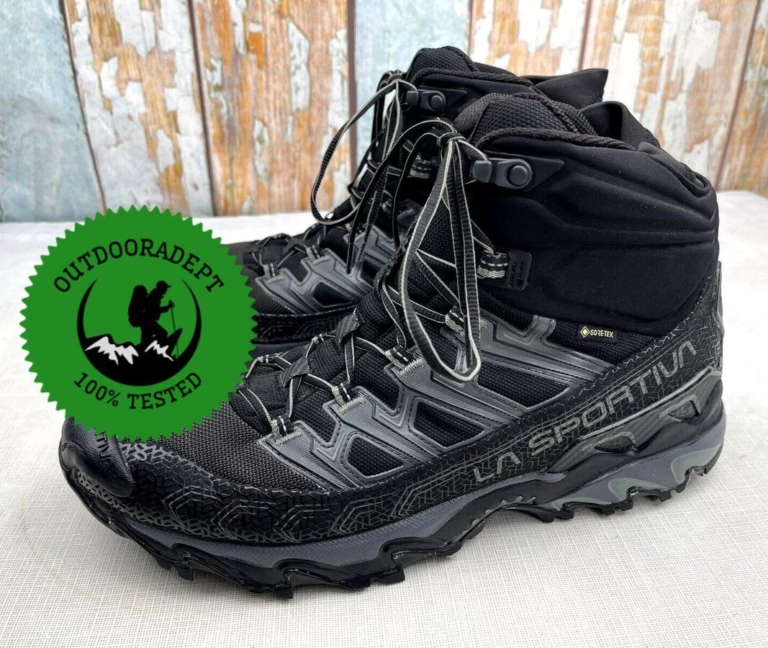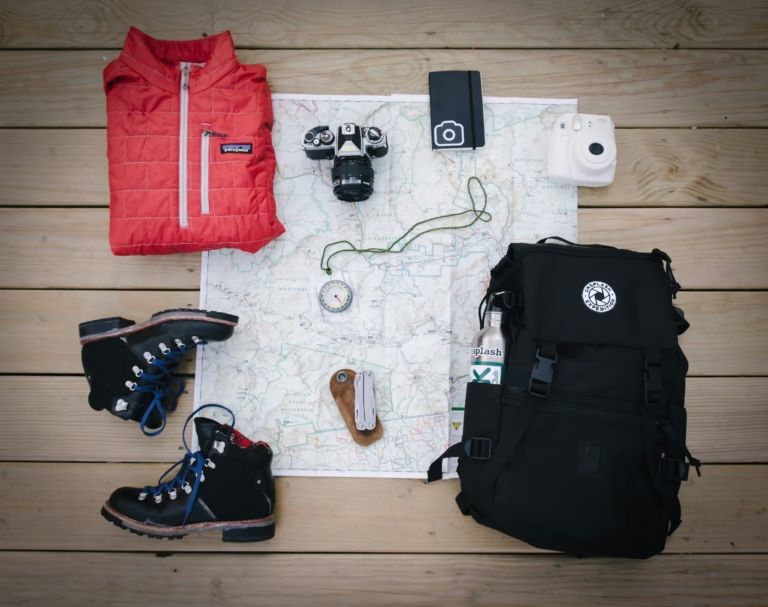Through countless hikes, I’ve learned that good hiking shoes with strong ankle support are essential, especially on rough or tricky trails. With my weaker ankles, a single misstep can lead to a painful sprain or injury, which is something I definitely want to avoid.
In this article, I’ll dive into hiking boots specifically designed to deliver optimal ankle support. I’ll share a curated list of the finest options and explain why these boots earned their spot on the list.
I’ll also walk you through the key considerations when shopping for hiking boots, ensuring you make a well-informed choice for your outdoor adventures.
Additionally, I’ll break down the critical differences between standard footwear and those equipped with ankle support. This will help you fully understand the benefits of investing in the right pair of boots.
The Verdict – Our Number One Pick
I felt confident wearing these on various hikes and felt like my ankle area always remained fully supported, especially when it came to their excellent traction.
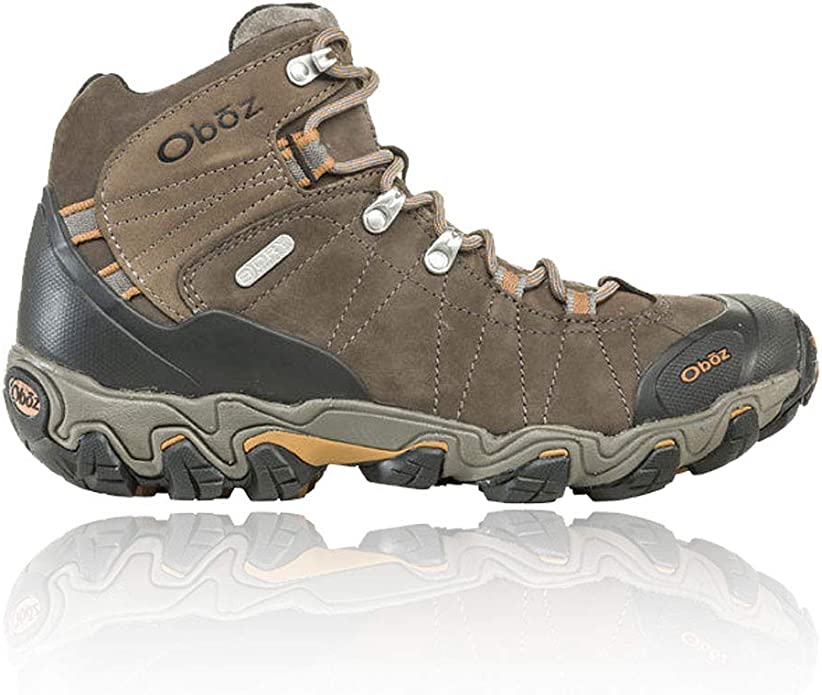
Although all the top hiking boots on our list performed well in the area of ankle support, the Oboz Bridger Mid B-Dry are my favorite hiking boots. They offered better ankle support, excelled with durability, and waterproof capabilities.
They also had some great extra features as well, like the self-cleaning lugs and rubber toe and heel caps.
We tested 23 hiking boots in various US and European locations to find the top 11 hiking boots with ankle support. Trials covered diverse terrains and assessed waterproofing, breathability, and insulation in different weather conditions. Our team, with expert input, determined the break-in period and rated boots on fit, cushioning, tread, and more. External feedback and warranties were considered for our recommendations. Learn More.
Our Top Recommended Hiking Boots For Ankle Support
1) Oboz Bridger Mid B-Dry Hiking Boot
Additions like the molded rubber toe cap and rubber reinforced heel help protect both your foot and the boot from damage caused by sharp objects such as rocks.

These superbly crafted waterproof hiking boots provide outstanding ankle support. They effectively prevent foot fatigue and ensure stability on the trails.
If you’re a fan of nubuck leather, you’ll definitely appreciate how it covers the entire upper part of the boot.
In our review of the Oboz Bridger Mid B-DRY, I noticed it offers remarkable breathability thanks to perforations in the nubuck leather upper.
What really impressed me was the waterproof membrane hidden beneath the leather. It consistently kept my feet dry, even when crossing shallow streams.
Moreover, this membrane efficiently wicks away moisture and sweat. Along with excellent ankle support, the boot delivers exceptional grip due to its robust tread that extends around the sides.
With my weak ankles, having reliable traction makes me feel more secure on the trails. This boot certainly does not disappoint in that area.
PROS
CONS
2) Salomon X Ultra 3 Mid GTX
The best part about this boot is that the uppers really wrap around your ankle to help it feel secure and provide the ultimate level of support.

Salomon consistently delivers top-notch boots designed to tackle various foot issues and handle diverse terrains. The X Ultra 3 Mid GTX is one of their standout models.
These boots provide an excellent balance between comfort and protection. They offer flexibility while keeping you safe in many hiking environments.
Their 100% waterproof construction really sets them apart. Combined with an easily adjustable lacing system, these boots rank among the best for ankle support.
These GTX hiking boots are also a great choice for those who want enhanced cushioning. The well-padded footbed and midsole greatly boost overall comfort.
From my experience, the chevron pattern on the rubber tread gave me superb grip, even on slippery surfaces. I never worried about twisting my ankle, even if I took a misstep.
PROS
CONS
3) Vasque Breeze at MID Gore-Tex Hiking Boot
These hiking boots provide great protection against water and winter weather and also excel at ankle support.
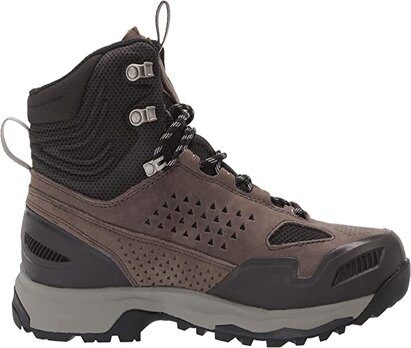
It’s not the lightest option you can buy, but for a mid-weight boot, it’s not terribly heavy, either. They are also quite breathable.
However, the larger holes in the mesh panels at the top tended to allow small pieces of dirt and debris to enter into the boot and also didn’t seem like it would resist tearing if put to the test in very rocky terrain.
I could feel them hugging my foot in all the right places as soon as I tried them on, which gave me confidence that they’d perform well on the trail.
And, indeed, I was right. Vasque Breeze is one of the best hiking boots with ankle support on the market, and many other users reported the same thing.
PROS
CONS
4) Salomon Quest Element Gore-Tex Hiking Boots
The gore-tex lining gives them solid waterproof protection, and you can expect to keep your feet dry with them.

Salomon Quest Element provides great ankle support while still remaining lightweight.
They won’t be as stable as a stiffer and heavier boot, but they felt like a really good in-between option for me and one that would work well for day excursions or light backpacking trips. I also liked that they didn’t require a long break-in period to feel comfortable.
This boot consistently ranks as one of the best hiking boots available and provides excellent performance regardless of the trail conditions.
PROS
CONS
5) Asolo Falcon GV
It’s lightweight for the amount of protection that it provides, which is great if you are hiking varied terrain or need to carry a heavy load.

This pair of hiking boots works great whether you’re sticking to the path or looking for off-trail adventures. It handles almost every type of terrain and keeps your feet secure and protected while doing it.
One thing I found in my Asolo Falcon GV testing was that it didn’t have as much cushioning as some of the other options, so I added my custom insole to the boot to ensure I didn’t have any soreness after a full-day hike, and that worked fine.
PROS
CONS
6) KEEN Targhee II Mid-Hiking Boots
The ankle support on these is exceptional, and they have a durable waterproof cover that helps them hold up well in harsh weather.

For going off-path, the KEEN Targhee II is a great choice. Consider it if you’re searching for winter boots. I was drawn to the classic look of this leather boot and the variety of unique colors beyond the usual brown and black.
The boots offer excellent cushioning for both men and women, providing comfort even on rough, rocky terrain with no significant impact felt.
The lacing system on these waterproof hiking boots also helps with their ankle support. It’s unique in that it allows for a very firm and controlled fit, much needed for people with bad ankles.
Once the boots are laced up tightly, your heel won’t slip, and your ankle is not going anywhere.
PROS
CONS
7) Lowa Renegade GTX Mid Hiking Boot
These made our list of best-hiking boots with ankle support because they’re not only comfortable and light but also great backpacking boots that can support heavy loads.

When we reviewed Lowa Renegade Gtx Mid we found it a bit stiffer than some of the other boots we tested, which gave great ankle support on rough trails and uneven surfaces.
I tend to prefer a more flexible boot that allows me to move faster but was surprised by how comfortable these boots felt, even right out of the box.
These also have a waterproof membrane for wet conditions and reliable traction, even on very slippery rocks and mud.
PROS
CONS
8) Columbia Newton Ridge Plus II Waterproof
Additions like the molded rubber toe cap and rubber reinforced heel help protect both your foot and the boot from damage caused by sharp objects such as rocks.

The Columbia Newton Ridge Plus is a popular pair of women’s hiking boots (the men’s version is the Plus II). Like most other Columbia hiking shoes, they are lightweight hiking boots but still durable enough to hold up to the elements.
Made of full-grain and suede leather, also work well in all types of weather, including rain (because of their waterproofing), and are affordable.
I really like just how versatile these boots are. The rubber outsole is substantial enough to provide a good grip, but they also look great, and I’ve worn them a few times casually.
The lace-up closure on these boots provides a very secure fit, especially where you need it the most, to prevent rolled ankles. They’re also very cushioned, which makes them comfortable for longer treks.
PROS
CONS
9) Vasque Talus at Ud Mid Hiking Boot
Its well-defined arch, supportive leather upper, and stiff sole give it more support than your average hiking shoe.

Many other hikers who tried these shoes liked them because of their well-padded heel bed and tongue area.
I agree with this assessment and found them comfortable, especially in the tongue area, where I couldn’t feel the shoelaces.
For hikers who want decent support but prefer hiking shoes over hiking boots, the Vasque Talus is a good option.
PROS
CONS
10) Merrell Thermo Chill 6″ Shell Waterproof Sneaker
It’s referred to as a sneaker rather than a boot because the Kinetic Fit BASE insole is contoured like your foot and provides flexible but intuitive support.

These Merrell hiking boots are probably the best option on the list if you’re looking for a traditional hiking boot to hold up in cold weather and snow. This boot is very insulated, without being heavy, and will keep your feet very warm and dry.
I wore these for a full-day hike and found they remained extremely comfortable throughout 8 hours of hiking. Because of the high cut, my ankles felt supported the entire time.
The treads on these hiking boots work great and allow you to easily scramble over rocky surfaces.
PROS
CONS
11) La Sportiva Ultra Raptor II Mid GTX
The fit of these hiking boots is also nice and snug all around, hugging your foot like a sock.

The closing option on our list of best hiking boots for ankle support is the La Sportiva Ultra Raptor II. These hiking boots allow you to move fast through rugged trails without sacrificing support and stability.
Two things I noticed right away when I tried on these boots are that they are a lightweight pair of boots and have great cushioning around the ankle collar, which I appreciate, as many other high-top hiking boots provide good support but aren’t super comfortable in that area.
I also noticed that these tended to run a bit small, and I had to order a half-size to get a comfortable fit.
For more information on this product, check the La Sportiva Ultra Raptor II Mid GTX Review.
They’re also waterproof, which is a feature that’s important for versatility. These make a great option for off-trail adventures and mountain climbs.
PROS
CONS
Ankle Support Hiking Boots Buyer’s Guide

Hikers who tend to roll their ankles or have weak ones need to look for certain features when buying a new pair of hiking boots to ensure their feet and ankles remain secure throughout their hike.
Here are some things to consider as you search for the best pair of hiking boots.
1. Boot Cut
For hiking boots to offer excellent ankle support, they need a robust and durable upper material, which can include full-grain leather, nubuck, suede, or textile. Leather, in particular, shines when it comes to delivering top-notch ankle support.
However, hybrid designs that incorporate both leather and textile, like boots featuring leather and mesh uppers, can also excel in providing exceptional performance in this regard.
2. Heel
You want to ensure that your foot stays secure in the heel cup of the hiking boots. If your heel slips while you walk, it can also cause your ankle to slide and not remain supported, which can lead to ankle pain.
3. Sole
One of the most common causes of ankle injuries and rolled ankles is slipping while walking on mountain trails or other types of uneven ground. A thick rubber outsole with good treads and lugs will help prevent slips and reduce the chance of ankle injury.
4. Weight

Hiking boots should feature a strong and long-lasting upper material, such as full-grain leather, nubuck, suede, or textile, to ensure outstanding ankle support.
Leather, in particular, excels in providing superior ankle support. Nevertheless, hybrid designs that combine both leather and textile, like those with leather and mesh uppers, can also deliver exceptional performance in this aspect.
5. Cushion
Just like a backpacking boot, you want a good hiking boot with good cushioning around the feet for the most comfort.
However, if you’re concerned about ankle injuries or sprains, also look for boots that have an ample amount of cushion around the ankles as well.
Not only does this provide comfort, but it provides additional ankle protection as well.
6. Comfort
To provide excellent ankle support, hiking boots need a robust and durable upper material like full-grain leather, nubuck, suede, or textile. Leather, in particular, stands out for its ability to deliver superior ankle support.
However, hybrid designs that incorporate both leather and textile, such as those featuring leather and mesh uppers, can also perform exceptionally well in this regard.
7. Material
Hiking boots require a sturdy, durable upper material such as full-grain leather, nubuck, suede, or textile.
Leather, in particular, excels at delivering superior ankle support, although hybrid designs that combine leather and textile, such as those with leather and mesh uppers, can also perform admirably.
8. Good Laces
The way you lace your boots makes a big impact on how much ankle support they provide. You want boots with a system that allows you to customize how tightly you can lace up the boots to get the right amount of support that your ankle needs.
Comparison Table
| BOOT | PRICE | WATERPROOF | WEIGHT |
|---|---|---|---|
| Oboz Bridger Mid BDry | REI» $200 Backcountry» Check on Amazon» | Yes, BDry | 2 lbs. 6 oz. |
| Salomon X Ultra 3 Mid GTX | Check on Amazon» | Yes, Gore-Tex | 2 lbs. 1.5 oz. |
| Vasque Breeze AT Mid GTX | Check on Amazon» | Yes, Gore-Tex | 2 lbs. 11 oz. |
| Salomon Quest Element | $230 REI» $133 Backcountry» Check on Amazon» | Yes, Gore-Tex | 2 lbs. 6.4 oz. |
| Asolo Falcon GV | $195 REI» $182 Backcountry» Check on Amazon» | Yes, Gore-Tex | 2 lbs. 1 oz. |
| KEEN Targhee II Mid | $165 REI» $106 Backcountry» Check on Amazon» | Yes, Keen.Dry | 1 lb. 14 oz. |
| Lowa Renegade GTX Mid | $265 REI» $255 Backcountry» Check on Amazon» | Yes, Gore-Tex | 2 lbs. 7 oz. |
| Columbia Newton Ridge Plus | $99 Backcountry» Check on Amazon» | Yes | 1.75 lbs. |
| Vasque Talus at Ud Mid | $170 Backcountry» Check on Amazon» | Yes, Ultra-Dry | 2 lbs. 3 oz. |
| Merrell Thermo Chill 6″ Shell | Check on Amazon» | Yes, Gore-Tex | 2 lbs. 5 oz. |
| La Sportiva Ultra Raptor II Mid GTX | $199 REI» $199 Backcountry» Check on Amazon» | Yes, Gore-Tex | 1 lb. 7 oz. |
Do You Really Need Boots With Ankle Support?
When hiking in challenging environments like rocky terrain, steep slopes, mountains, or uneven surfaces, it’s crucial to wear boots that provide adequate ankle support. These conditions demand the stability and protection that such boots offer.
On the other hand, if your hiking plans involve day trips on flat, well-maintained trails, you may not require hiking boots with extensive ankle support, and alternatives like regular shoes, standard boots, or trail runners can be suitable choices.
In fact, opting for low-cut shoes during these hikes can contribute to the gradual strengthening of your ankles. However, if you have a history of ankle sprains or simply prefer the added security, boots with enhanced ankle support might be your preference.
Additionally, you can read our article where we debate if you need ankle support or not, and give tips on how to strengthen your ankles.
Does an Ankle Brace Offer Better Support Than High-Cut Hiking Boots?
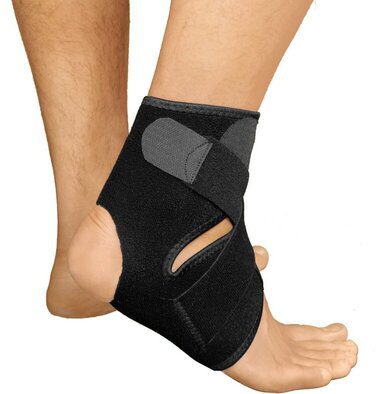
An ankle brace can provide excellent ankle support if you want to wear low-cut hiking boots.
However, it doesn’t necessarily offer better support than high-cut boots.
A good ankle brace can also offer additional ankle support for people who are extremely susceptible to rolling their ankles while hiking.
So you may want to even pair an ankle brace with a mid-height or high-cut hiking boot for maximum support.
What Is the Difference Between a Regular Shoe and a Boot with Ankle Support?


Like trail running shoes, does not come up high or fit around the ankle. Instead, it allows the ankle to move freely. Ideally, these types of shoes help strengthen the ankle because they don’t limit its movement.
A boot with ankle support considerably limits ankle movement, so you don’t have to use those muscles as much while you hike.
This stabilization of the ankle helps prevent any soreness during a long hike, which you’d likely experience if you wear regular shoes as your footwear instead.
What Else We Considered When Ranking the Best Hiking Boots for Ankle Support?

In our quest to identify the best hiking boots catering to individuals seeking robust ankle support, we scrutinized several crucial aspects before finalizing our selection.
Customer Feedback
We consistently take into account the feedback of other customers when assessing products. This time, we delved into the experiences of those in need of enhanced ankle support, considering their opinions on how well the boots excelled in this regard.
Shipping
Our exploration encompassed hiking boots that offered swift shipping options at reasonable rates. Additionally, we took into account the ease of return shipping and the process of exchanging or returning ill-fitting boots.
Warranty
A reputable brand invariably stands firmly behind its products. We scrutinized the manufacturer’s standing, its level of popularity, and whether the boots were backed by any form of warranty. Even when boots exhibited durability, having recourse against potential defects proved to be a valuable consideration.



